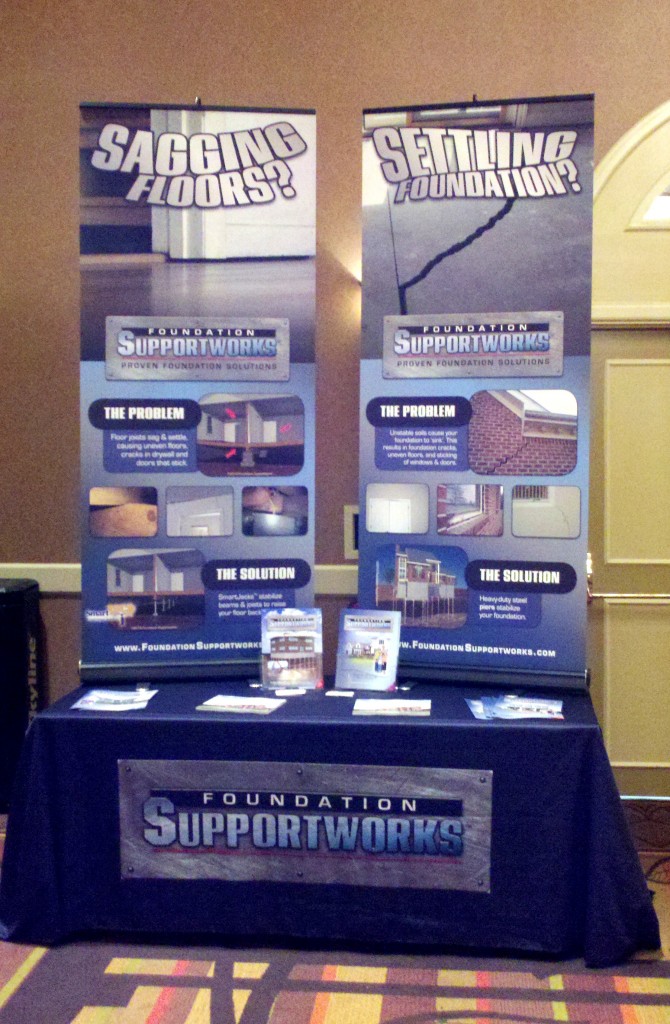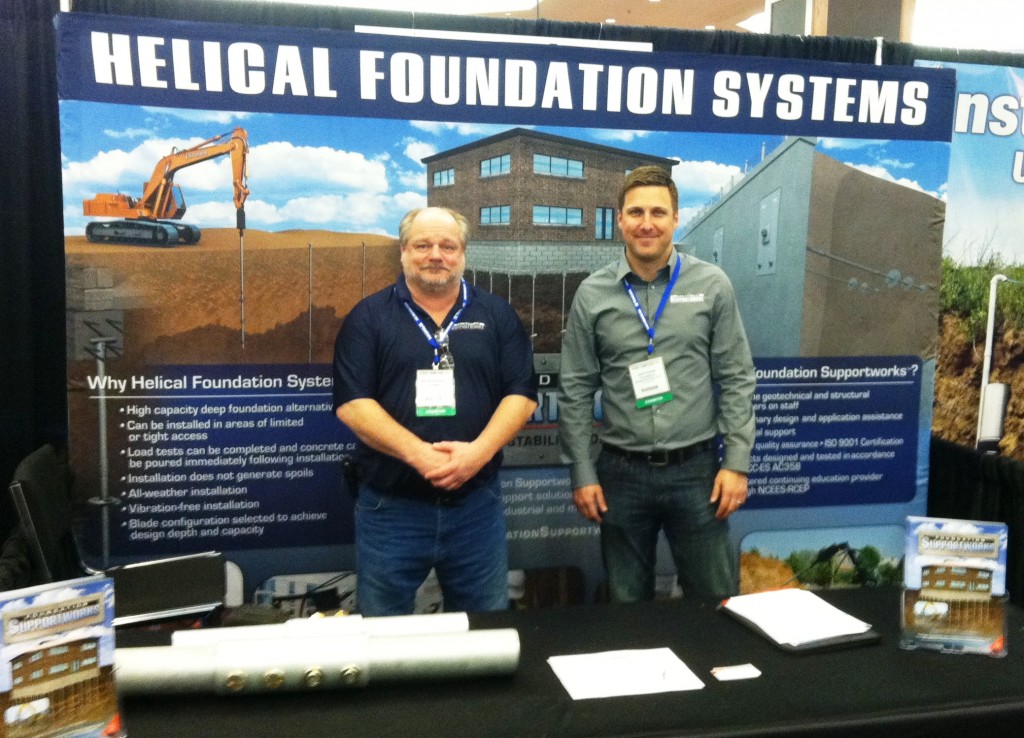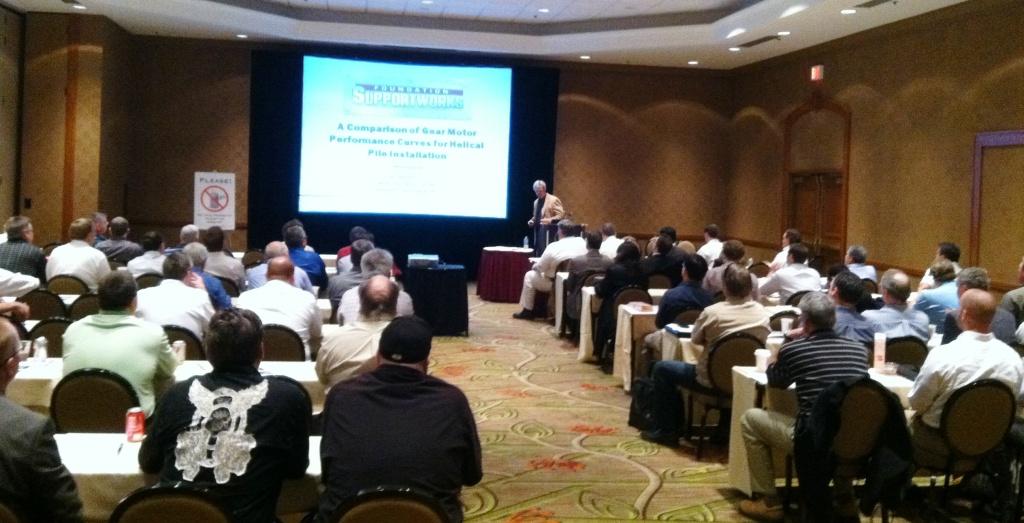Posts Tagged TX
Underpinning Contractors and Engineers Attend Foundation Repair Conference
 On April 26th and 27th, Foundation Supportworks exhibited at the Foundation Repair Association’s annual conference where they displayed their line of foundation stabilization systems. Throughout the event, many engineers, architects, and foundation repair contractors visited with Foundation Supportworks about the benefits of their systems and the various applications where they can be used to permanently stabilize settling structures.
On April 26th and 27th, Foundation Supportworks exhibited at the Foundation Repair Association’s annual conference where they displayed their line of foundation stabilization systems. Throughout the event, many engineers, architects, and foundation repair contractors visited with Foundation Supportworks about the benefits of their systems and the various applications where they can be used to permanently stabilize settling structures.
The event was held in San Antonio, TX and was attended by more than 160 engineers, architects, and geotechnical contractors from around the United States. The conference was divided into social, educational, and professional segments to highlight the advancements in the foundation repair industry. Among the topics that were presented during the short course seminars included Proper Foundation Design, Engineering Ethics, and Foundation Repair Methods.
The Foundation Repair Association (FRA) is a national organization that exists to promote high ethical standards in the practice of foundation repair, and to promote cooperation between the foundation repair industry and government.
Foundation Repair Contractors Receive Training about Various Foundation Repair Methods
 Jeff Kortan, P.E., Director of Engineering for Foundation Supportworks, presented at the Foundation Repair Association’s annual conference last week in Houston, TX. The Foundation Repair Association is a professional organization that exists to promote high ethical standards in the practice of foundation repair and to promote cooperation between the foundation repair industry and government.
Jeff Kortan, P.E., Director of Engineering for Foundation Supportworks, presented at the Foundation Repair Association’s annual conference last week in Houston, TX. The Foundation Repair Association is a professional organization that exists to promote high ethical standards in the practice of foundation repair and to promote cooperation between the foundation repair industry and government.
At the conference, Jeff presented about two common foundation repair methods: Push Pier Systems and Helical Pier Systems. The push pier presentation discussed how push pier systems are designed and tested, the proper way to install push pier systems, and how the systems develop a factor of safety. The presentation about helical pier systems explained common helical pier terminology, typical applications, how capacity is determined and verified, load testing, and ICC-ES Acceptance Criteria 358, which outlines the proper design and testing of helical foundation systems.
Geotechnical Engineers Learn about Helical Foundation Systems at the Geo-Frontiers 2011 Conference
During the week of March 13, 2011, Foundation Supportworks exhibited at the Geo-Frontiers 2011 conference where they displayed their line of helical foundation systems. Throughout the week, many engineers, students, professors and foundation repair contractors visited with Foundation Supportworks engineers about the benefits of helical pile and helical anchor systems.
The event was held in Dallas, TX and was attended by more than 1,900 engineers, architects, students, professors and geotechnical contractors from around the world. The conference featured advances in geotechnical engineering and attendees had the opportunity to participate in training sessions where they could obtain professional development hours and learn about leading technologies in the geotechnical industry.
The event featured six full-day short courses, four plenary session lectures, more than 450 papers presented in 89 technical sessions, student activities and competitions, ample time for networking, and informational exhibits.
Presentation on Helical Foundations and Tiebacks Given by Foundation Supportworks Engineer
Don Deardorff, P.E., Senior Application Engineer for Foundation Supportworks, recently presented at the Deep Foundation Institute (DFI) Helical Foundations and Tiebacks seminar in Dallas, TX. His research project, “A Comparison of Gear Motor Performance Curves for Helical Pile Installation,” documented the efficiencies of eight different drive-head motors at all ranges of differential pressure.  The effects of varying equipment, flow rate, and hydraulic hose diameter were also observed in order to see what changes occurred in relation to torque and pressure. Based on his evaluations, Don was able to create motor specific torque versus differential pressure curves for Foundation Supportworks installing contractors to utilize during the installation of foundation stabilization systems. He concluded that the actual performance of a given drive-head motor during helical pile installation may not reflect the manufacturer’s stated performance data when criteria such as equipment, flow rate, and hose diameter are taken into account. The DFI event was attended by over 80 engineers, professors, and foundation repair contractors from all over the world. The Deep Foundations Institute is a non-profit association which promotes understanding and advancement of the deep foundations and excavations construction industry through conferences, publications, and community.
The effects of varying equipment, flow rate, and hydraulic hose diameter were also observed in order to see what changes occurred in relation to torque and pressure. Based on his evaluations, Don was able to create motor specific torque versus differential pressure curves for Foundation Supportworks installing contractors to utilize during the installation of foundation stabilization systems. He concluded that the actual performance of a given drive-head motor during helical pile installation may not reflect the manufacturer’s stated performance data when criteria such as equipment, flow rate, and hose diameter are taken into account. The DFI event was attended by over 80 engineers, professors, and foundation repair contractors from all over the world. The Deep Foundations Institute is a non-profit association which promotes understanding and advancement of the deep foundations and excavations construction industry through conferences, publications, and community.